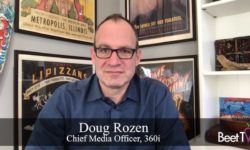The fragmentation of the media marketplace has challenged advertisers to develop improved methodologies to measure the effectiveness of their campaigns. The demand for outcomes-based metrics also has increased as consumer spending habits have changed during the pandemic.
“We are moving from outputs to outcomes,” Marla Kaplowitz, president and CEO of the American Association of Advertising Agencies (4A’s), said in this interview with Beet.TV. “There is an increased focus to understand what is being delivered, and if you look at the last year and a half, we’ve had such an acceleration particularly on the performance side and with e-commerce.”
Advertisers face additional hurdles in improving their measurement methods as more regions enact privacy laws that give consumers greater control over how their personal data are gathered, shared and used for ad targeting. Technology companies have responded by gradually limiting the use of tracking cookies that help to measure online ad performance.
“It’s going to require everyone to come together to really think about what does attribution look like moving forward,” Kaplowtiz said. “We need tools, and we need access to be able to look across the ecosystem, not just have this group of walled gardens where we look at this in isolation, but how do we understand holistically what’s going on with a campaign.”
Advertisers are seeking ways to get a more comprehensive view of consumers as they spend time among different media platforms. They’re also looking for data that help to compare ad performance throughout those channels.
“There are so many business use cases out there, and one tool or one piece of technology may only apply to one piece of that,” Kaplowitz said “You may need to leverage different approaches, and that’s going to be a little bit more complex and challenging.”
Agency Compensation
The 4A’s collaborated with Google and Forrester Research to study how outcomes-based measurement affects the way agencies are compensated. Kaplowitz said performance-based pricing is better than full-time equivalent (FTE) models, but requires additional metrics.
“It’s a positive move, but it also relies on having good data in order to connect it back and ensure that you can accurately define what the performance was based on the activity that was put in place,” she said.
Ad-ID Adoption
The 4A’s has undertaken several initiatives to transform the media ecosystem, such as urging marketers to support diversity and inclusion in their ad spending. The organization also is working to drive adoption of Ad-ID, an identity solution for creative assets on any platform or in any format. NBCUniversal last month became the first major media company to adopt Ad-ID as a standard across its One Platform portfolio.
“We are now investing in new technology and capabilities for these, but we need everyone to adopt this,” Kaplowitz said. “It’s primarily been used for linear television, and we want that to be the ubiquitous code on every single … creative asset moving forward.”
You are watching “Outcomes-Based Advertising: Connecting Ad Exposure to Business Results,” a Beet.TV Leadership Series presented by LoopMe. For more videos, please visit this page.











































